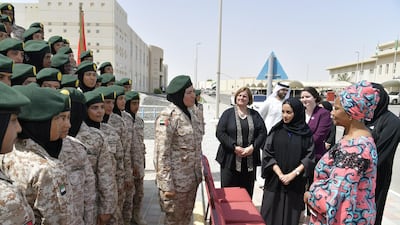The UN and countries around the world celebrate the International Day of UN Peacekeepers on May 29 every year; this is the date when the first peacekeeping mission was established in 1948. It is an occasion to honour UN peacekeepers. They work in the world’s most dangerous spots and protect millions of people and the most vulnerable communities.
Since the establishment of the peacekeeping missions, nearly one million people have served under the UN flag, within 72 missions, and nearly 4,200 of them have lost their lives. Therefore, the International Day of UN Peacekeepers is an important occasion to highlight their role in supporting ceasefires, responding to violence, investigating human rights violations, and building peace, recovery, and post-conflict development in war-torn countries.
The UN recruited women in peacekeeping missions in recognition of the unique value they bring and the fact that their involvement in peacekeeping missions ultimately makes them more effective. Women are more able to access local communities, provide protection to women and girls, who are victims of sexual and gender-based violence, a common issue in conflict zones, and they are role models for women and girls in male-dominated and highly gendered societies.
Simply put, the presence of women in peacekeeping missions advances the gender responsiveness of these operations and strengthens their ability to engage with local authorities to promote long-term stability and development.

In 1993, women constituted only 1 per cent of peacekeeping missions, but this figure slowly grew over the years. Between 2018 and 2021, the number of women staff officers and military observers increased from 12.3 to 17.8 per cent; and the number of women individual police officers rose from 22.3 to 30.4 per cent; and women in formed police units went up from 9 to 14.8 per cent.
These figures are still modest, and there needs to be greater political commitment to bring more women into peacekeeping. In this regard, the UN has set goals for the participation of women in peacekeeping missions. The 2028 target for women serving in military contingents is 15 per cent, 25 per cent for women military observers and staff officers, 20 per cent for formed police units, and 30 per cent for individual police officers.
However, at the current rate, it would take 30 years to reach gender parity for military troops, 12 for formed police units, eight for individual police officers and seven for military observers and staff officers.
The question is: with the widening political divisions and escalating global violence, can we afford to wait? I think not.
The theme for this year's International Day of UN Peacekeepers is People Peace Progress: The Power of Partnerships. These words very much define peacekeeping; it is both a process and an outcome. Protecting people is at the heart of peacekeeping efforts, and we need to create enabling environments and partnerships with all stakeholders to support peace, facilitate the protection of civilians, enhance law enforcement and protect human rights.
Women are particularly good at partnerships and mobilising people to achieve both progress and peace. Moreover, women peacekeepers have proven that they can perform the same roles, to the same standards and under the same difficult conditions as men. The case for recruiting and retaining women peacekeepers is blatantly clear.
The UAE believes that no lasting peace or stability can be achieved if half of the world’s population is prevented from participating equally and fully in society, politics, the economy and in peace building. So much so that one of the commitments of its 2022-2023 UN Security Council tenure is to champion the agenda of women, peace and security.
Strengthening women's role in building and sustaining peace was also the objective behind the launch of the Sheikha Fatima bint Mubarak Women, Peace, and Security Initiative, to support women's participation in building and sustaining peace, in the region and around the world.
The initiative aligns with Security Council Resolution 1325 (2000), which urged all actors to increase the participation of women and incorporate gender perspectives in all UN peace and security efforts. It also established the women, peace and security agenda as a global priority.
The Sheikha Fatima bint Mubarak Women, Peace, and Security Initiative, launched in 2018 as a partnership between the Government of the UAE and UN Women, seeks to create an enabling environment for women, increase public awareness about the correlation between women and peacekeeping, as well as build women’s capacities in the military and peace building sectors.
Under the initiative, training and capacity building programmes were conducted in Abu Dhabi in 2019 and 2020 with 357 women, from 18 Arab, African and Asian countries, receiving basic military and peacekeeping training over 12-week courses.
Achieving gender parity in peacekeeping hinges on the continued collective efforts of the UN and member states to advance the Declaration of Shared Commitments on UN Peacekeeping Operations. In this regard, the UAE stands out as a strong proponent of women in peacekeeping, which doubtlessly contributes to peacekeeping operations that are fit for the future.


